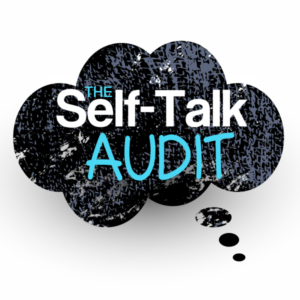As soon as we learn to talk, we start talking to ourselves. That means most of us have been carrying on these deeply internal conversations for a very long time! Sometimes what we say to ourselves is fairly harmless, but that isn't always the case. When the chatter turns into negative self-talk, do we really damage our self-esteem and relationships with others?
We reached out to several experts in psychology to get their feedback on the impact of negative self-talk and what can be done to reduce its frequency. Most of the feedback was in alignment with our expectations, but there were a few surprises along the way!

Most of our experts agreed that negative self-talk is a normal part of our human experience.
Negative self-talk can give us insights into our beliefs that can help us move past self-imposed limitations as well as identify self-sabotaging behaviors.
Impacts of Negative Self-Talk
Impacts of negative self-talk can include:
- Keeping you from achievement of your goals.
- Inhibiting creativity.
- Depression and anxiety.
- Reinforcing limiting beliefs.
- Feelings of being helpless and hopeless.
- Self-doubt.
- Poor self-esteem.
- Distorting or exaggerating circumstances.
- Lack of self-confidence that affects career, relationships, and overall wellness.
None of these are very helpful to those of us trying to create a rich and fulfilling life!
Just a note - we are focusing on negative self-talk, which the Psychology Dictionary defines as "the expression of thoughts or feelings which are counter-productive and have the effect of demotivating oneself." https://psychologydictionary.org/negative-self-talk/.
Some forms of self-talk may seem "negative" but as expert Jairek Robbins (see more from Jairek below) points out:
It may seem that “negative self-talk” is always a bad idea, but a study by sports psychologist Dr. Judy Van Raalte found some surprising results. She found that something she calls “instructional self-talk” (which might seem “critical” or “negative”) helps many athletes in sports performance. Also, an athlete who is tired and needs to push himself or herself may need a different “type” of self-talk than they need when they are “fired-up” and eager to compete. Surprisingly, the results of this study suggest that sometimes negative self-talk is associated with better – or at least no worse – performance than positive self-talk.
This type of self-talk is NOT something that stops us in our tracks, but can be motivating us to reach for more.
How Can We Reduce Negative Self-Talk?
Truly negative, debilitating self-talk tends to send us into a downward spiral that can seem difficult to recover from. But our experts offer several ways to recover from its effects.
THE SELF-TALK AUDIT
Quickly identify your destructive self-talk with this FREE checklist and rescript your mind for success!
G. Beverly Bergmann

G. Beverly Bergmann is an activist for children who are at risk and with developmental disabilities. She is Chairman Emeritus with the Board of Directors for Young Musicians Foundation and has funded the Bergmann Technology Labs.
Bergmann graduated Magna Cum Laude from Pepperdine University with a Bachelor’s degree in Communication and Data Processing. She holds a Master of Arts in Spiritual Psychology.
Later this year her series of books, entitled “Love, Life and Light,” will be released.
Address your self-talk as it comes forward in your consciousness:
- Balance in the moment with a smile or chuckle ("oh, there it is again!").
- Acknowledge the accomplishment that you desire to achieve.
- Visualize the result.
- Take a gentle and deep breath, and
- Compliment and remind yourself that you are capable and worthy of achievement.
- Choose a memory of a treasured moment in a time when you resonated with success.
- Viscerally feel it and listen to the affirmations you wish to hear; voice them to yourself.
As you consciously make the decision to act in an affirmative way when self-talk comes forward, self-talk frequently will diminish.
Sean Brawley
I have found there two critical steps to reduce negative self-talk:
1. Become an Observer. It’s important to realize the voice in your head isn’t you, it’s just a tape playing. Watch what it says like you would clouds going by in the sky unattached.
2. “That’s interesting.” The second step is to notice what your mind is saying with interest and curiosity. “Where is that coming from?” “Why do you think that?” “What do you want?”
When you dialogue with your inner critic you’ll soon discover that this voice actually cares about you and wants what’s best for you. It’s just going about it in a way that isn’t effective. When you see that clearly, the voice naturally quiets over time and allows more space for you to be who you are.
Sean Brawley is passionate about helping people grow and succeed as leaders.
A performance consultant for Spencer Stuart’s Leadership Advisory Services, Sean has more than 25 years of experience working with some of the most successful sports teams and a wide variety of corporations. Sean helps them sustain high performance in high-pressure environments
Suzy Christensen

Suzy Christensen holds a BS degree in Kinesiology from the University of Colorado/Boulder.
She is the mother of 3.
Suzy lives in Fort Collins, Colorado.
She is a certified instructor Satori Qi Gong/ Flow Form and a Neurocoach.
One of the most effective ways to “disconnect” from those negative voices is to mindfully observe them without judgment.
Don’t try to stop them, just watch how they constantly change. Take a minute, yawn and stretch, and relax. Imagine you are watching a movie screen with someone criticizing you.
If you don’t hear anything, make stuff up - the wilder the better! After a minute or two you’ll feel more calm and able to focus on the positive voices in your head!
Super slow movement such as Qi Gong can help us become more aware, in the present moment, observing our own thoughts without judgement.
Mark Waldman
Your prefrontal lobes are constantly generating positive and negative thoughts. When you find yourself ruminating too much on worries, fears, and doubts, try this simple solution:
- Take a sheet of paper and write down every negative thought you’ve had for the past week or month.
- Now, mindfully gaze at the list as you yawn and stretch and deeply relax. Notice how calm you feel.
- By observing your negative thoughts you won’t get lost in them. They might actually help you to avoid a big mistake!
- Our brain-scan research shows that any form of contemplative meditation or affirmations stimulates optimism in your left prefrontal lobe!

Mark Waldman has authored 14 books, including the bestseller How God Changes Your Brain, an Oprah pick in 2012. His new book is called NeuroWisdom: The New Brain Science of Money, Happiness, and Success.
Mark has an international practice as a NeuroCoach. He trains students and business leaders in this unique, evidence-based strategy for enhancing personal and professional development.
For more information, go to www.MarkRobertWaldman.com.
Sheryl Aronson

Sheryl Aronson has been a Marriage Family Therapist for over 25 years. She has a private practice in South Orange County and North Hollywood, California, specializing in relationships and women’s self-esteem.
Sheryl was a featured guest/ relationship expert on the Montel Williams Show and The Berman Sister’s television show in Los Angeles. She has written articles on relationships for the Orange County Metropolitan Awareness magazine and Beach Cities/Valley magazine.
I call the act of negative self-talk "emotionally abandoning ourselves."
In other words when we go inside ourselves, who is there to welcome us? Is it the critical voice or critical parent? Or is it the supportive, loving voice who accepts us and encourages us?
Think about this scenario... if a friend came to you saying I don't feel lovable, I'm not smart enough, would you tell them that they are correct?
Would you say, that's right your'e a terrible person who doesn't deserve love?
Instead you would encourage them and give them support.
That's what we need to do to for ourselves as well. Exchange that negative self-talk for finding out how you're truly feeling. Then accept that feeling and find a caring, supportive voice.
Christopher Salem
The solution is to address the root cause to the limited beliefs that trigger negative self-talk.
This is being aware of not being in a place you desire and accepting where you are now.
Next, you make a commitment to the process to eliminate limited beliefs by addressing the root cause.
The root cause is tied a specific parent that in certain situations subconsciously triggers negative emotions that drive this negative self-talk.
Meditation and journaling, along with an organization task like making your bed, are critical to get to the root cause of these emotions. Then let it go fully through forgiveness.

Chris is an accomplished business & emotional intelligence strategist, world-class speaker, award-winning author®, certified mindset expert, radio show host & media personality. He partners with businesses to help them overcome their limiting beliefs.
Chris is the originator of the term Prosperneur™—an individual whose health and wealth are in alignment in a way that leads to true prosperity. His book Master Your Inner Critic / Resolve the Root Cause – Create Prosperity addresses this and went international best seller in 2016.
Nicola Gimson

Nicola Gimson is a Neurocoach and Mindfulness teacher based in the UK.
Nicole combines practical neuroscience and positive psychology for personal and professional development.
She strives to help you strengthen your relationships both at home and in the workplace. She offers 1 on 1 coaching either face to face or via zoom.
Follow these steps:
- Set some time aside and set an alarm to go off every 15 minutes.
- On every ring, mindfully explore your thoughts, and record as many negative memories you remember.
- Then repeat but with positive thoughts.
- Compare both and work out your positive/negative ratio.
This exercise help you become aware of your thoughts and how negative you actually are. If you can generate 3-7 positive thoughts for each negative one, you can undo any resulting neurological or psychological damage.
With repetition, you can therefore effectively reduce any concerns generated by negative self-talk. This includes increased anxiety, rising stress levels, and damaged relationships.
Jairek Robbins
When we are seeking peak performance, we can all benefit from a shift in our mind and in our body.
I like to use breathing as a way to make this shift happen. “Box breathing” is a technique of taking slow, deep breaths. This type of breathing can improve performance and concentration, while also reducing stress.
[Box breathing is done by inhaling for a 4 count, holding air in for 4 count, exhaling for a 4 count, and holding for a count of 4. Then repeating that cycle.]
I also like to use “4x2” breathing to improve my focus.
Once your mind is focused, flood your mind with:
- Gratitude.
- Your 20-year vision.
- Your current 12-month goals.
- The actions you will take today to make progress on your goals!

Jairek Robbins is a #1 bestselling author, performance coach and lifestyle entrepreneur.
Jairek is dedicated to helping individuals around the world achieve success by living with purpose in their lives and in their work.
Jairek has led training for a wide range of companies and organizations, and continues to unlock secrets for maximizing performance and organizational success.
Connect with Jairek through:
https://www.instagram.com/jairekrobbins/
Dr. Nanci Shandera

Dr. Nanci Shanderá, Ph.D., is a transformational-alchemical psychologist and an inductive spiritual teacher.
Nanci specializes in Dreamwork, imagery, pre-birth Soul Agreements, Alchemy, Women's Mystery School, and Transperceptive Art.
She is an author and director of EarthSpirit Center for the Transformational Arts in Nevada City, where she offers classes and counseling.
Visit her website at www.EarthSpiritCenter.com.
Self-talk lies in a foundation of energy. It is our intention, conscious or not, drawing from energy, that creates the results or manifestation of that which we are telling ourselves.
Most are not aware that our beliefs are founded upon intention, whether a belief is:
- a learned one (from others or culture), or
- one driven by the emotion of need, or
- one’s ego-protector.
Carl Jung taught that transformation of consciousness occurs by diving deeply into one's Shadow. The Shadow is that part of us that hides, rejects, ignores, and fears what lies in the closet of our imagination.
Though our imaginings are fueled by our experiences, I have found, personally and professionally, that the Shadow holds all the riches we desire if we view it without judgment.
We discover the treasure in it by looking into its face with courage and intention. Approached in this way, our self-talk is a doorway to self-discovery and freedom.

